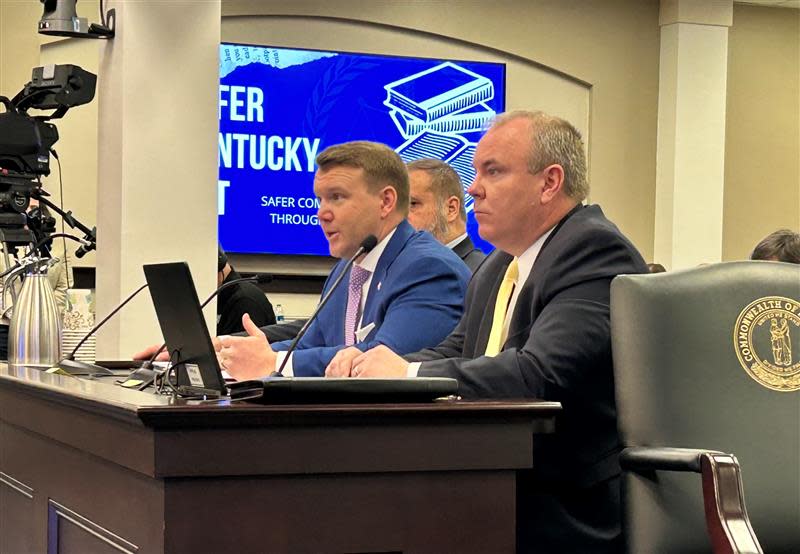'Safer Kentucky Act,' controversial public safety bill, takes key step forward
FRANKFORT - After about two hours of contentious testimony at the Kentucky Capitol, the wide-ranging and controversial bill aimed at improving public safety moved forward.
House Bill 5, a 72-page piece of legislation that would stiffen penalties for many criminal offenses while placing new limits on charitable bail funds and outdoor camping, passed the House Judiciary Committee on Thursday, a critical step as its Republican sponsors push to get it approved during the 2024 General Assembly. The bill now goes to the full House.
Rep. Jared Bauman, R-Louisville, is the driving force behind the bill, one of 52 co-sponsors. The Jefferson County lawmaker, in his first term in Frankfort, said Thursday's vote showed how much support the legislation has. He also said he was "grateful" for all the speakers who were for and against it.
"I think we learned a lot today from all that testimony and we look forward to continuing to improve the bill as we go through the next steps," he said after the hearing.

The "Safer Kentucky Act" has drawn controversy since its blueprint began to take shape last year, with Republicans rolling out an early plan in late September and a full draft in December.
The bill filed in the session last week includes several items its sponsors believe would improve public safety, including:
Life in prison for those found guilty of three separate violent felonies;
Classifying carjacking as its own crime, a Class B felony;
Putting the death penalty on the table for those convicted of murdering a police officer or other first responder;
Limiting charitable bail organizations to payments of less than $5,000, and limiting those organizations from bailing out people accused of violent crimes;
Tougher penalties for those convicted of fentanyl trafficking;
Allowing business owners to use force to prevent people suspected of shoplifting from escaping;
And a ban on street camping, while allowing local governments to designate temporary camping locations (a provision preventing federal funds to go toward permanent housing for members of the homeless community if initiatives do not include "behavioral and rehabilitative requirements" was cut ahead of Thursday's meeting).
The bill drew supporters to its committee hearing, a packed house at the Capitol Annex, including Kentucky State FOP Vice President Ryan Straw along with Courtney Baxter, a commonwealth's attorney in counties east of Louisville, and Hardin County Attorney Jenny Oldham, who acknowledged the bill is "not perfect yet" but has support among Kentucky prosecuting attorneys.
"Prosecutors believe in second chances. We believe in redemption," said Oldham, who's also president of the Kentucky County Attorney's Association. "... But we cannot have our hands tied and we cannot focus more on the rehabilitation of an offender than we can innocent life and innocent communities."
But the massive bill and the impact its six-dozen pages of provisions would have on the commonwealth has been a magnet for criticism, and Thursday's hearing was an opportunity for many opponents to make their feelings clear.
Jason Hall, director of Catholic Conference of Kentucky, said using law enforcement and the criminal justice system to address people experiencing homelessness is counterproductive. He called for addressing root issues, such as providing affordable housing.
Kentucky doesn’t have a homeless shelter in every county, noted Rep. Steven Doan, R-Erlanger, and nearly 4,000 people in the state experience homelessness on a given night, according to the National Alliance to End Homelessness, with the highest rates in Louisville and Lexington.
Shameka Parrish-Wright, director of the VOCAL-KY advocacy group and Louisville Metro Council member, said the bill criminalizes poverty and would only add to the state's incarceration problem. Kungu Njuguna, a policy strategist with ACLU of Kentucky, said his organization believes legislation should focus on substance use treatment and mental health services instead of enhanced penalties for offenders, which would discourage drug users from reporting overdoses for fear of consequences.“This imperfect bill takes a misguided attempt to address the fentanyl and overdose crisis by targeting individuals who sell or distribute even the smallest amounts of fentanyl" and charge them with murder, Njuguna said.
Two Louisville Democrats, Reps. Keturah Herron and Nima Kulkarni were among the loudest voices against it, arguing it would increase incarceration rates without making the state safer.
Speaking after the vote, Kulkarni said the provisions in the bill that expand the number of people who would spend life in prison without the option of parole sends a message to younger generations that "we're willing to lock you up and throw away the key, and that particular strategy has been proven over and over not to work" while taking power out of the hands of judges and prosecutors who can work with discretion on a case-by-case basis.
Still, key supporter Rep. Jason Nemes, R-Louisville, said he believes the bill can be "too lenient" against violent offenders by giving them three strikes. He believes the law should allow just two strikes before you're out, he said, noting the state has plenty of treatment options available for people who need help.
"That is what we are about – recovery, helping folks who need to be recovered, loving on our people," he said. "But we're also about people who commit violence on our people, and putting them away for a long time. That's what this bill is supposed to do."
Reach Lucas Aulbach at laulbach@courier-journal.com. Reach Hannah Pinski at hpinski@courier-journal.com.
This article originally appeared on Louisville Courier Journal: Safer Kentucky Act passes Kentucky legislature committee amid criticism

